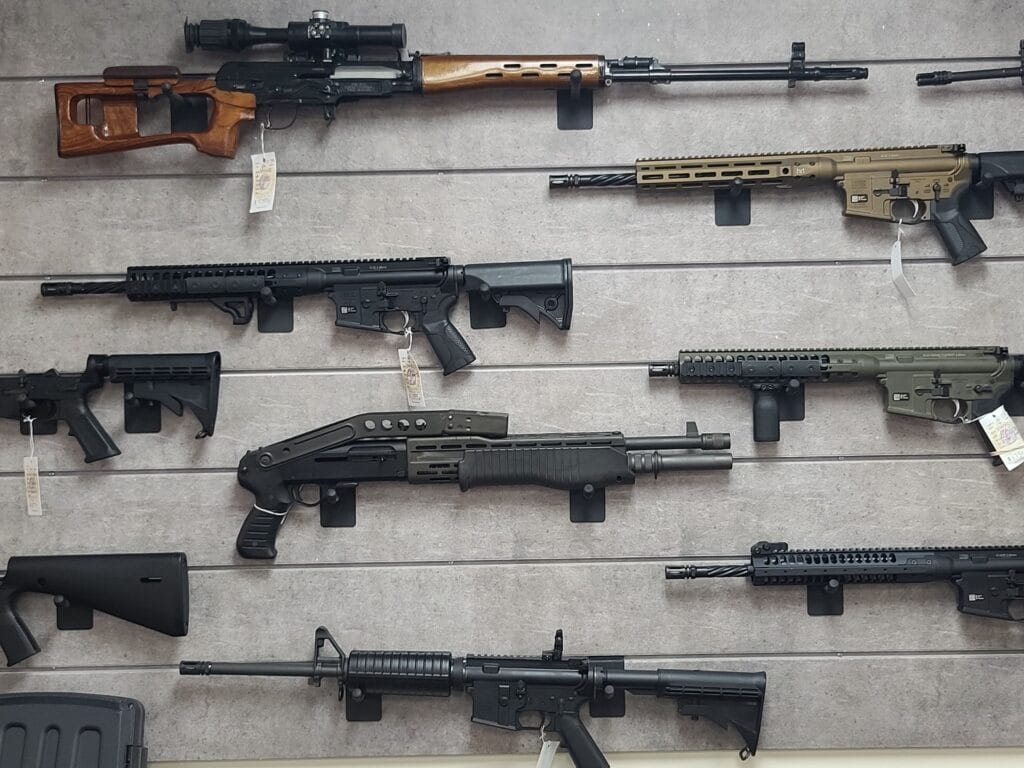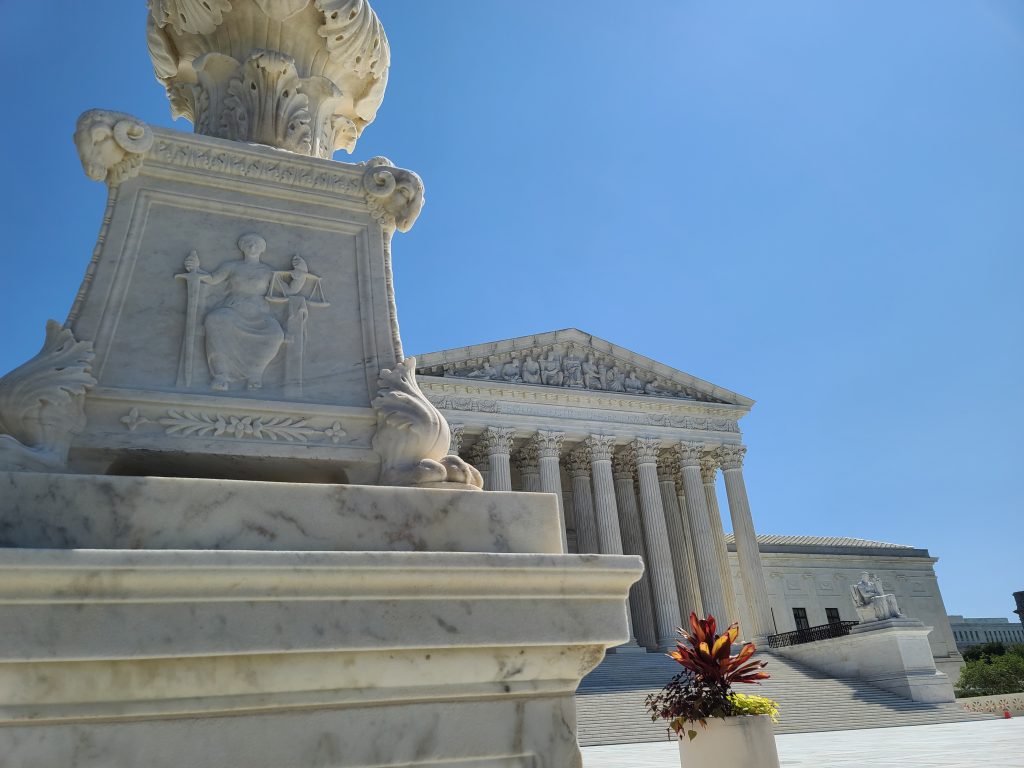It has only been a few weeks since the Supreme Court reworked the legal landscape on guns in New York State Pistol and Rifle Association v. Bruen.
We’ve seen new laws passed that seek to defy what the Court has done. We’ve seen lawsuits filed to challenge those new laws. And we’ve even seen some of those cases succeed. So, where are things headed?
Well, one of those successful challenges happened in small-town Colorado. It beat a local ban on AR-15s under the new standard. And Contributing Writer Jake Fogleman explains why that win may indicate the effort to upend state preemption laws is doomed.
I also take a look at the kind of argument New York has come up with to defend its strict gun-carry law after the Supreme Court struck down a similar measure. It’s creative but in the worst way possible. Experts I spoke with explain where the argument came from and why it’s unlikely to be successful.
Plus, Alan Gottlieb of the Second Amendment Foundation lays out his group’s approach to filing new cases in the wake of Bruen.

Analysis: Preemption Fight May Become Increasingly Moot After Bruen [Member Exclusive]
By Jake Fogleman
It was with great interest that both gun-rights and gun-control proponents watched as Colorado became the first state in the nation to broadly repeal state preemption over gun regulation in 2021.
The impetus for the move was simple. Despite Colorado trending blue in recent years, gun control remains a politically perilous issue at the state level, particularly when it comes to aggressive policies like categorical weapon bans. By repealing state preemption, cities and counties in more liberal regions of the state would be free to shoot for the stars when pursuing new gun-control laws.
And that’s exactly what happened. Since last year’s preemption repeal, the City of Denver has been able to ban “ghost guns” and restrict which areas even licensed carriers can go. Additionally, four cities in Boulder County—Boulder, Louisville, Superior, and Lafayette—plus the County itself have all passed a broad array of gun restrictions that go far beyond what the state has imposed.
Enter the Supreme Court.
The Bruen decision not only struck down New York’s subjective and restrictive policy for gun-carry permitting, it also established a new test for evaluating the constitutionality of gun-control laws. It’s one that most experts agree casts doubt on the viability of many modern restrictions, including “assault weapon” and ammunition magazine bans. And it’s already starting to have that effect on aggressive localities in Colorado.
Just last month, a federal court judge granted a temporary restraining order against the town of Superior over its recently passed assault weapon and magazine ban.
“The conduct regulated by this provision of the Amended Code, the right to possess, sell, or transfer illegal weapons, (which, as defined, include weapons commonly used by law-abiding citizens for lawful purposes), is covered, at least in part, by the Second Amendment, and therefore that conduct is presumptively protected,” U.S. District Judge Raymond Moore, an Obama appointee, wrote in his opinion. “The Court is sympathetic to the Town’s stated reasoning. However, the Court is unaware of historical precedent that would permit a governmental entity to entirely ban a type of weapon that is commonly used by law-abiding citizens for lawful purposes, whether in an individual’s home or in public.”
Since that ruling, gun-rights activists have filed three new lawsuits against the Cities of Boulder and Louisville as well as the government of Boulder County over nearly identical bans. Given the recent success in Superior, where a judge found that the challenge to the bans had a “strong likelihood” of success on the merits, those suits have a good shot at being successful as well. That could have a major chilling effect on the momentum that has been building behind localities passing gun control around the state and across the country. It’s certainly the effect gun-rights advocates are going for.
“Last month, we promised our members we would sue over these unconstitutional gun control laws, and today we are making good on our promises,” Taylor Rhodes, Executive Director of Rocky Mountain Gun Owners (RMGO), said in a press release. “Again, it doesn’t matter how big or how small the localities are — if you pass unconstitutional gun control, we will sue you. RMGO is proud to have filed the first two post-Bruen cases in America and based on our early success against the Town of Superior, the floodgates are open.”
The entire rationale behind the preemption repeal was to allow liberal-leaning cities to enact stricter gun control than is politically feasible at the state level without being encumbered by the courts. With lower courts now under a new mandate for reviewing gun cases from the Supreme Court, that rationale is not as viable. In turn, other states that once looked on with curiosity at Colorado’s preemption experiment may not be as inclined to follow its lead if it turns out not to be as efficacious at achieving local gun control as its proponents originally hoped.
To be sure, it’s still far too early to tell how courts will continue to apply the Bruen test to cases arising over local gun laws. Other federal court rulings have demonstrated how judges can use the test to uphold even the youngest and most novel restrictions when they want to. That could be enough to give gun-control proponents renewed hope for the strategy.
But if the experience in court is anything like that of the case in Superior, state preemption law repeals, long a bugaboo of gun-control advocates, may not be as potent a weapon as they once seemed.
Podcast: The Second Amendment Foundation’s Alan Gottlieb on Filing Gun Cases After Bruen [Member Early Access]
By Stephen Gutowski
The Supreme Court’s decision in New York State Rifle and Pistol Association v. Bruen is going to have a monumental impact on the nation’s gun laws. So, we’ve spent quite a lot of time talking about it on the podcast. We’ve talked to analysts and experts, including National Review‘s Charles Cooke and Duke’s Andrew Willinger.
But we haven’t talked to anybody who is directly involved in the legal fight. That’s why Alan Gottlieb of the Second Amendment Foundation (SAF) is joining the show this week.
His group is involved in dozens of cases across the country. That includes a number of the most high-profile post-Bruen cases, such as the one against the California youth gun advertising ban.
Gottlieb said Bruen has completely upended the legal landscape. He said gun-rights advocates have a tremendous opportunity to win many more cases. He explained SAF’s strategy for approaching the newly-unsettled landscape.
He said SAF has come up with a tier system with the ones it thinks it’s most likely to win in the first tier and the rest moving down tiers from there. Gottlieb said there are a lot of cases in that top tier, especially with the new laws California and New York have passed as a seemingly purposeful affront to the Court’s ruling. He said he isn’t much concerned about governments coming up with coherent defenses of their strict laws in light of Bruen, but he does think a form of legal minimization may become more common.
We also have a new members segment this week featuring Douglas Jefferson!
Plus, Contributing Writer Jake Fogleman and I talk about New York’s shocking court filing where they compared their gun laws to bigoted historical gun bans.
You can listen to the full show on your favorite podcasting app or by clicking here. You can also watch the episode on our YouTube channel. The episodes go public every Monday and Reload Members get exclusive early access on Sundays.
Make an Appearance on the Podcast
One of the many perks of a Reload membership is the opportunity to appear on the podcast for a special segment. If you’re interested in joining me, simply reply to this email. We’d love to have you on!

Experts Doubt New York Citing Bigoted Gun Bans Will Work in Court [Member Exclusive]
By Stephen Gutowski
Citing prejudiced historical gun bans is unlikely to convince federal courts to uphold New York’s “good moral character” clause.
That’s one of the key takeaways from what several Constitutional law experts told The Reload. Those experts doubted the state’s argument would persuade judges, especially those at the Supreme Court.
“This analogy seems unlikely to persuade the courts,” Adam Winkler, a constitutional law professor at UCLA, told The Reload.
Josh Blackman, a South Texas College of Law professor specializing in Constitutional law, agreed.
“I do not think New York’s argument will gain much traction,” he told The Reload.
The office of New York Attorney General Letitia James (D.) defended the state’s practice of denying gun-carry permits on the subjective basis of whether officials believe they are of “good character” by pointing to an “Anglo-American” tradition of barring Native Americans from owning guns.
“From the early days of English settlement in America, the colonies sought to prevent Native American tribes from acquiring firearms, passing laws forbidding the sale and trading of arms to Indigenous people,” the Monday filing reads.
The state further pointed to laws denying people their gun rights based on religion as another example of the tradition its requirement is based in.
“[E]ven after the English Bill of Rights established a right of the people to arm themselves, the right was only given to Protestants, based on a continued belief that Catholics were likely to engage in conduct that would harm themselves or others and upset the peace,” the filing said.
New York admitted the laws they claimed as “relevantly similar” to their own were bigoted. However, it argued they remained viable as examples of the state denying gun rights to those they deem dangerous or suspect even though those determinations were based largely on prejudice.
“A clear-eyed look at American history and doctrine will necessarily reveal episodes that are shameful but nonetheless relevant, as the Bruen opinion teaches us,” the filing said in a footnote. “Of course, if a modern instance were to arise where gun licensing requirements were applied in a discriminatory manner, it could, should, and would be struck down as unconstitutional.”
The experts said New York likely used this line of argument in order to try and fulfill the Supreme Court’s new standard for upholding gun restrictions. In New York State Rifle and Pistol Association v. Bruen, the Court decided modern gun regulations that conflict with the text of the Second Amendment can only be upheld if there is a historical analogue for them.
Winkler and Eric Ruben, a Constitutional law specialist at Southern Methodist University’s Dedman School of Law, said the argument is doing what the Court required.
“I think it’s important not to lose sight of why New York is talking about these historical gun laws: because Bruen requires the government to point to historical analogues to shore up the constitutionality of modern-day gun laws aimed at modern-day problems,” Ruben said. “We are likely to see a lot of odd attempts at historical analogy simply because the conservative majority in Bruen said that’s how Second Amendment cases are to be litigated, as opposed to a more conventional approach like tiered scrutiny. Before Bruen, I doubt we’d see arguments like this.”
Robert Leider, Assistant Professor at George Mason University’s Antonin Scalia Law School, said attempts to draw a connection between the modern licensing requirement and 17th or 18th Century bigoted gun bans are proving perilous. He said New York’s argument is unpersuasive and the result of having little else to rely on.
“There is not much historical precedent for many of New York’s current gun control laws,” Leider told The Reload. “Trying to find historical support anywhere it can, New York is now using laws that discriminated against American Indians and Catholics to justify their current laws. New York is stringing together these precedents to support a vague general principle that the government can disarm anyone the government deems dangerous.”
Winkler agreed the argument is born out of the limited number of historical gun laws New York has to pull from.
“The Court says that only laws from the 1700s and 1800s can provide historical precedent for today’s gun laws, and many gun laws in those older days were discriminatory,” he said. “NY is now forced to look to a racist past to justify current gun restrictions.”
However, he noted New York isn’t the first to make this comparison.
“Don Kates and other gun rights advocates have argued that felon bans are just modern-day versions of Founding-era laws banning blacks from possessing firearms,” he said. “They have argued for years that government can limit guns to ‘trustworthy’ or ‘virtuous’ people, and those early racist laws were just an unfortunate application of a broader government power.”
Andrew Willinger, Executive Director of the Duke University Center for Firearms Law, noted the argument has even been referenced by Justice Amy Coney Barrett in a gun case while she was a district court judge.
“While it’s not cited in this portion of NY’s brief, this is largely the same theory that then-Judge Amy Coney Barrett articulated in her 2019 dissent in Kanter v. Barr,” he said. “Justice Barrett considered these laws, and others, to constitute a historical tradition establishing ‘that legislatures have the power to prohibit dangerous people from possessing guns.’”
Willinger suggested that could indicate Barrett and others on the Court may be open to the idea. However, Leider argued the Court is unlikely to be persuaded the bigoted prohibitions are similar to New York’s law even if decoupled from their prejudiced motivations.
“[M]ost of these laws affected only those who were thought, at the time these laws were passed, to be beyond the protection of the right to bear arms,” he said. “They are not good precedent to demonstrate how restrictive laws may be against those who fell within the right to bear arms.”
Blackman noted the Court has taken a dim view of trying to argue racist gun restrictions are instructive if applied equally to everyone.
“The United States has an unfortunate history of denying civil rights to certain groups,” he said. “Bruen recognized that slaves and freedmen, in particular, were denied the right to keep and bear arms, while white people were allowed to exercise their Second Amendment rights. Bruen recognized that race-based denial of this civil right does not undermine the existence of the civil right.”
Still, most of the experts agreed that subjective consideration for who can and can’t obtain gun-carry permits has a better chance of surviving for other reasons.
“I think New York’s stronger argument in support of the good moral character requirement—and the argument the state led with in its brief, even though the historical comparators are likely to get more attention—is that the Court in Bruen specifically blessed licensing frameworks with a ‘good moral character’ or ‘suitability’ requirement such as DE, CT, and RI,” Willinger said. “Looking at footnote 1 of the majority opinion, the Court doesn’t seem to have any issue with these types of requirements so long as they don’t operate in practice like the ‘proper cause’ test.”
Leider said “some discretionary judgments” are likely to survive scrutiny.
“Many shall-issue states have these provisions in their laws, including states with fairly liberal gun policies such as Pennsylvania and New Hampshire,” he said. “I doubt the courts will invalidate all discretionary criteria.”
However, he said New York’s tendency to set low bars for denying permit applications could put it at special risk of having its regulations struck down.
“New York may find individual decisions vacated in as-applied challenges,” Leider said. “For example, New York City had threatened to refuse firearm licenses to individuals with too many traffic citations. After Bruen, I doubt New York City can continue that policy.”
That’s it for now.
I’ll talk to you all again soon.
Thanks,
Stephen Gutowski
Founder
The Reload







